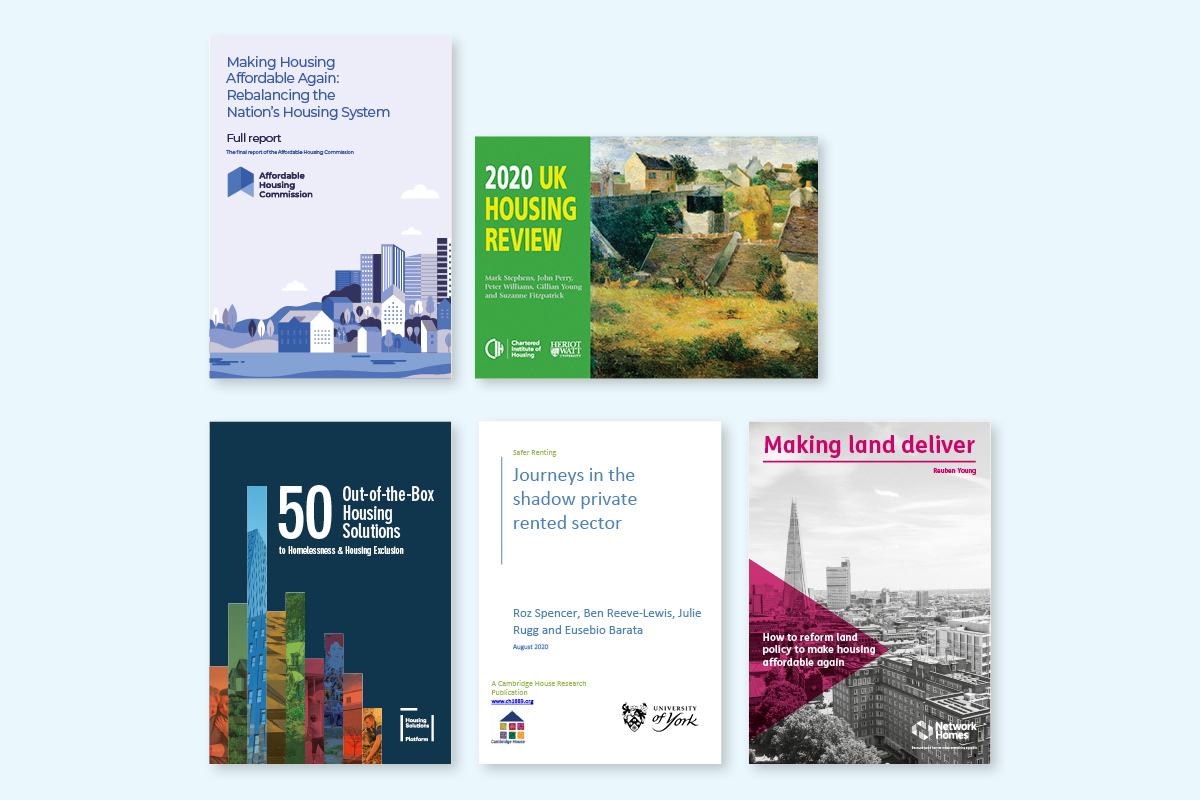You are viewing 1 of your 1 free articles
The Thinkhouse Review: the top five housing reports of the past year
At the start of the new year, Richard Hyde gives us the lowdown on the most influential housing reports of 2020
What a year we had! But with 2020 now over, it is time to reveal the most influential housing reports of the year.
During the year nearly 200 reports were uploaded and categorised in our web library and each one was assessed by our editorial panel. The panel considers the quality of the research, innovation or the breadth of analysis and whether the recommendations can be translated easily into policy or influence decision-makers.
The panel is made up of 18 members, drawn from a cross section of the housing world spanning academia and research to the not-for-profit and business sectors.
The panel’s assessments translate into a score which we use to rank and then showcase the top-scoring reports in the must-read section on the 2020 page. Last year we selected 12 reports.
So, here is our top five in reverse order and why we selected them. If you want a quick fix of the latest and most influential thinking, these are the ones you should look at.
In fifth place is a report by the Housing Solutions Platform, which is a partnership between the European Federation of National Organisations Working with the Homeless (FEANTSA), Fondation Abbé Pierre and Housing Europe. Their wonderfully wide-ranging report that is a true compendium of housing innovation, 50 out-of-the-box Housing Solutions to Homelessness & Housing Exclusion, was published in January 2020.
The 50 projects focus on providing decent and affordable housing to those affected by or at risk of homelessness. The projects use many different means including innovative construction, making use of the private rental sector, social housing, integrated approaches and more.
The innovative housing solutions selected also provide ways to overcome financial and political barriers within European housing systems. Some projects can be debated or contested. But none of them are intended to represent a silver bullet that would solve the housing crisis. All represent ad hoc, local, sometimes very small-scale efforts to fill the gap left by existing housing systems.
In fourth place is Making Land Deliver by Network Homes and authored by Reuben Young, who first came to our attention with his 2019 submission to our Early Career Researcher’s Prize.
This report was reviewed by Anya Martin for our Inside Housing blog in July 2020, who said the report highlights the poor incentives developers and landowners face, encouraging speculative behaviour at the expense of affordable housing contributions.
It proposes some practical measures to take pointless negotiations out of the process by replacing developer contributions with a flat-rate tax, which local authorities can use to buy homes at a prearranged price onsite or spend elsewhere. It provides welcome recognition of how systemic incentives determine behaviours and how they can be improved, away from simplistic explanations of market baddies.
In third place is Making Housing Affordable Again: Rebalancing the Nation’s Housing System by the Affordable Housing Commission, published in the spring. At 262 pages long, it was one of the most comprehensive the panel assessed in 2020.
Its main conclusion was the reason that so many households were struggling with disproportionate housing costs was the switch into the private rented sector from both social renting and from homeownership. This sector has more than doubled in size in less than 20 years.
It generally offers less security and significantly higher rents, and the obstacles for potential first-time buyers have also confined more of them to private renting where they too face less security and, over a lifetime, greater cost.
Our runner-up is a perennial favourite of the editorial panel. The UK Housing Review 2020 published in March by the Chartered Institute of Housing. Unlike almost all the other reports on our site, this is published behind a pay wall. However, much of the content is available to download from the above link.
Our editorial panel felt that the data and analysis within this document is so fundamental to our understanding of why we are not building enough homes that it merited its star billing this year.
“[The first place report] was truly a report that went to the root of some of the inequalities that dominated 2020”
In first place and the Thinkhouse editorial panel’s most highly ranked report of 2020 is University of York and Cambridge House Research Publication’s Journeys in the Shadow Private Rented Sector, which our editorial panel assessed in September. This report was felt to brilliantly set out some of the fundamental failings of the private rental sector.
Martin Wheatley in his October blog for Inside Housing said: “This devastating report lays bare how highly vulnerable tenants are targeted by landlords and letting agents deliberately undertaking multiple breaches of tenancy and housing law in order to maximise their rental profit.”
The report sets out a range of recommendations for how policymakers should take urgent action to tackle the problem of people stuck in the low-income private rental sector.
Three themes are highlighted. First, that law-enforcement agencies need to do more to prevent illegal evictions, making better use of existing powers within the Protection from Eviction Act 1977 and taking advantage of temporary powers available to police during the COVID-19 crisis.
Second, a new regulatory framework is required to oversee the private rental sector, with a particular focus on providers of low-income tenancies. Third, that poor housing has contributed to the unacceptably low levels of progress towards equality for BAME people – addressing the impact of poor-quality, multi-occupancy and insecure housing is an essential part of the response to structural inequalities highlighted by the Black Lives Matter movement.
This was truly a report that went to the root of some of the inequalities that dominated 2020 and well deserves it place at the top of the Thinkhouse editorial panel’s reports of the past year.
Note: for the purpose of this article we included all reports published in the 12 months to the end of November.
Richard Hyde, founder and chair of Thinkhouse, with contributions from other members of the editorial panel












